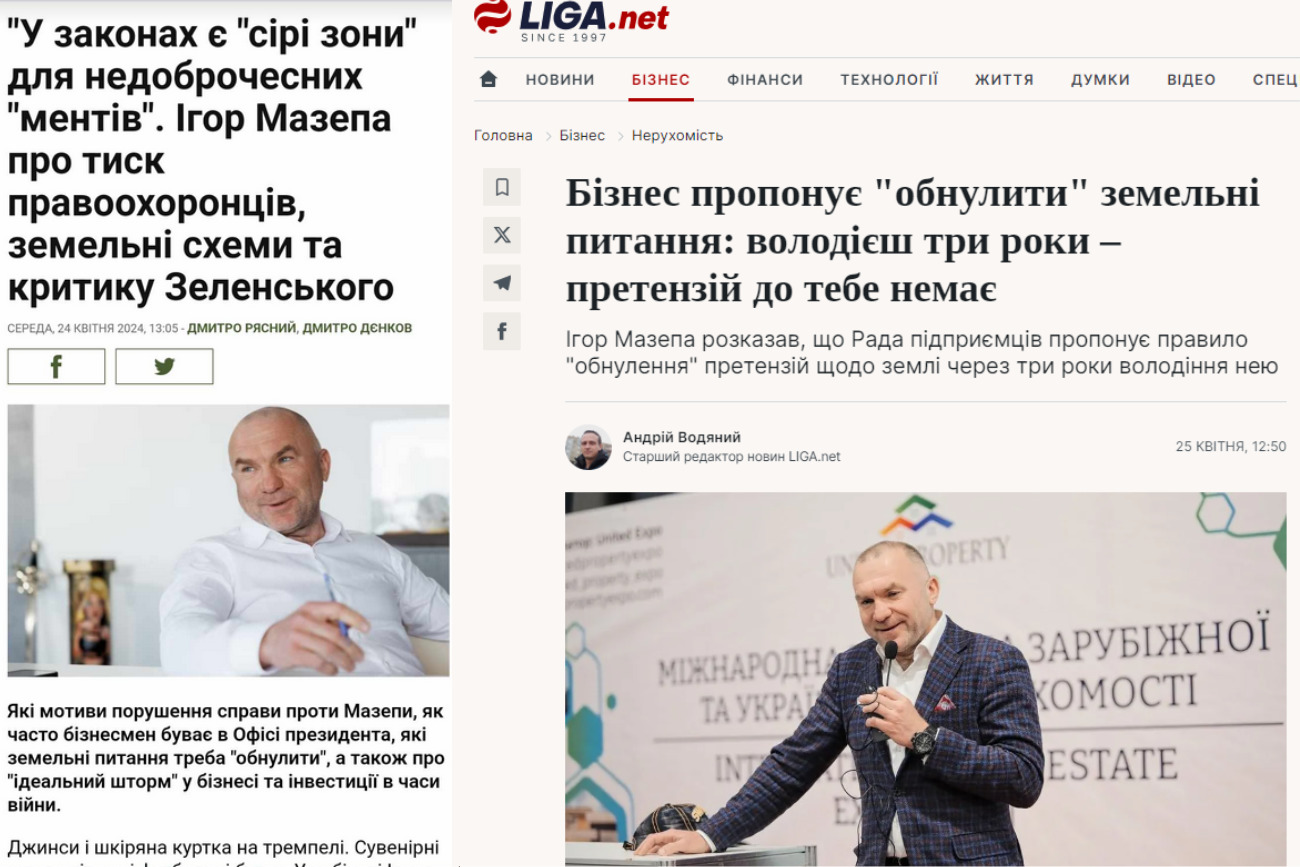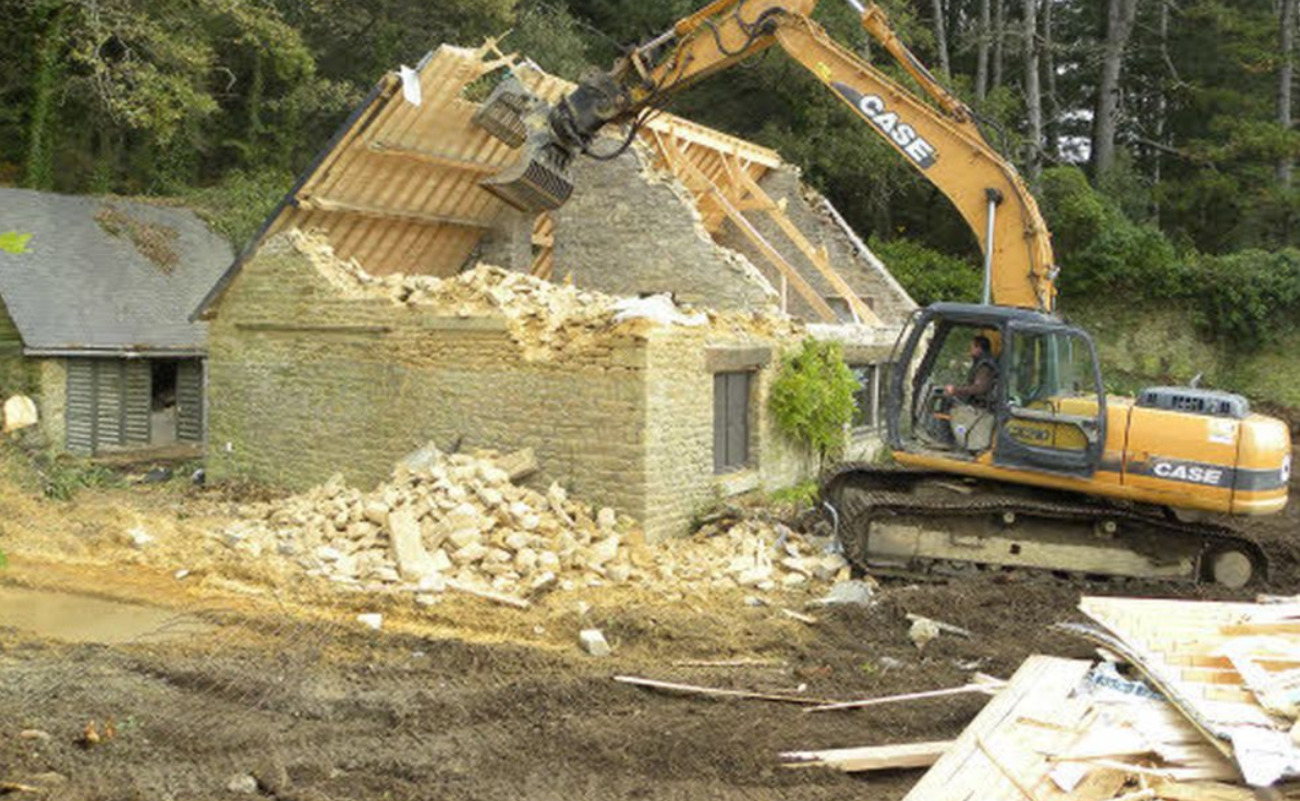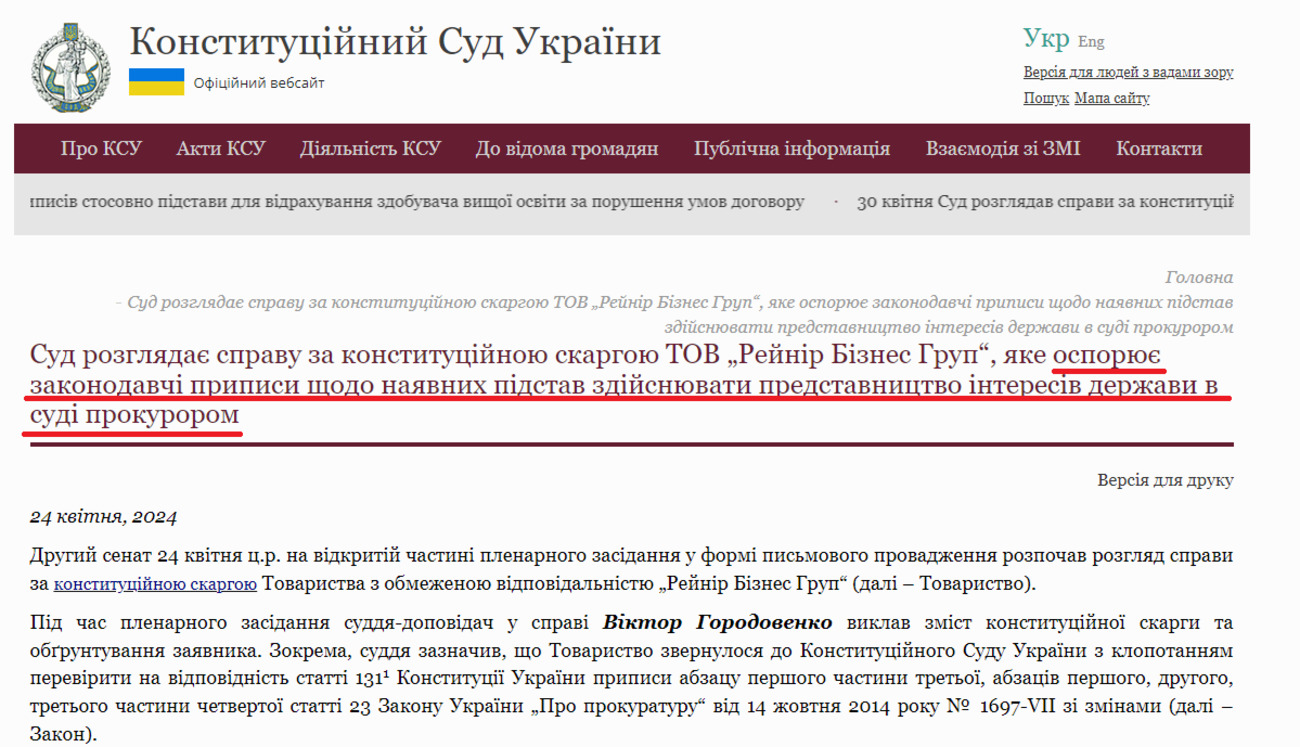Лоббисты застройщиков во власти предлагают обнулить претензии к дерибанщикам лесов, побережий и парков…
В парламенте появился проект, который предлагает «амнистию дерибанщикам» и карт-бланш чиновникам на отчуждение лесов, прибрежных и пограничных полос, заповедников, ландшафтных парков, памятников природы, ботанических садов и т.д. (11185). Если парламент поддержит эту инициативу, государство и общины смогут возвращать свое имущество через суды только в течение пяти лет с момента выделения. Застройщики уже начали массированную кампанию в СМИ, объясняя, почему претензии к ним надо «обнулить».
Более того, чтобы заблокировать возможность прокуратуре защищать интересы государства, застройщики уже обратились в Конституционный Суд.
Леса, природно-заповедный фонд, прибрежные полосы и земли обороны всегда привлекали застройщиков и агробизнес. Во времена президента-предателя Януковича и на парламент, и на судебную ветвь власти влиял тогдашний заместитель главы Администрации президента Андрей Портнов. И именно тогда парламент принял изменения в процессуальные кодексы, которые ограничили суды в возможности защиты государством и территориальными общинами их интересов в судах. От этого должны были выиграть прежде всего недобросовестные застройщики. Но после старта судебной реформы 2016-2017 годов в Верховном Суде нашли возможность не допустить реализации этой схемы.
Почему попытка Портнова провалилась?
При Януковиче через парламент нардепы от «Батькивщины» Валерий Писаренко и Владимир Пилипенко провели изменения в законы, которые должны были ограничить возможность прокуратуре защищать в таких делах интересы государства или общины. Центр политико-правовых реформ отметил в 2011 году, что парламент принял закон, который «защищает права рейдеров» и привел по этому поводу цитату Портнова: «После этого каждый владелец будет понимать, что у него это (имущество) забрать уже никак не возможно».
То есть ключевая идея лоббистов застройщиков заключалась в том, чтобы ограничить для прокуратуры срок на обращение в суд с иском и на обжалование судебных решений, о которых не знало государство и общество как собственники земли. В результате этого много раздерибаненных земель лесного, водного, природно-заповедного фондов, рекреационного назначения, обороны и т.д. стало бы невозможно вернуть через суды.
Союз с нардепами-«батькивщиновцами» для Портнова был неслучайным. До того, как перейти на службу к Януковичу, он занимал одну из руководящих должностей в предвыборном штабе Юлии Тимошенко. В те времена именно «Батькивщина» была связана с рядом дерибанных историй на Киевщине. Земля вблизи столицы, где сохранились зеленые зоны и незастроенные побережья, — самая дорогая. Жители общин, где зеленые зоны отдают под высотки, противостоят титушками застройщиков.

В течение нескольких лет законодательные нормы, которые противоречили интересам государства и громад, суды таки применяли. Но после реформы Верховного Суда стали на защиту интересов государства и территориальных общин.
Большая палата Верховного Суда рассматривает каждое дело в составе 21 судьи. Это — особо сложные случаи. Так нарабатывается судебная практика для всей страны. Чтобы защитить право украинцев на водные и лесные ресурсы, парки, объекты культурного наследия Большая палата начала применять ст. 391 Гражданского кодекса, которая позволяет владельцу требовать устранения препятствий в осуществлении им права пользования и распоряжения своим имуществом. Благодаря этому удалось вернуть земли в Григорьевском и Бугском лиманах Черного моря, на курорте Коблево, в Ягорлицком заливе, водоохранной зоне вдоль реки Стугны и тому подобное. Так же удалось вернуть громаде Киева историческую усадьбу Терещенко.
И теперь указанную норму и еще одну, которая касается возможности истребования собственником имущества из чужого незаконного владения (ст. 388 Гражданского кодекса), авторы законопроекта пытаются уничтожить. Таким образом пытаются похоронить положительную судебную практику 2018-2024 годов, потому что предыдущие попытки сделать это в отдельных делах Верховного Суда провалились в его Большой палате.
Кто эти лоббисты?
Итак, в конце апреля в парламенте появилась законодательная инициатива, которая может превзойти то, что пытались узаконить во времена Януковича.
Главный автор инициативы (11185) — народный депутат Степан Чернявский («Слуга народа»). Соавторами стали также народные депутаты, которые были избраны как представители партии власти от Киевщины: Сергей Бунин и Александр Горобец. Последний неоднократно писал депутатские обращения, которые можно трактовать в пользу дерибанщиков Беличанского леса. К слову, в рядах «Батькивщины» на последних местных выборах также обнаружены связанные с дерибаном Беличанского леса политики. Для того, чтобы защитить этот лес от застройки в суде активистам понадобилось 15 лет.
Аналитик ОО «Украинская природоохранная группа» Петр Тестов отмечает: если за проект проголосуют, то схемщикам достаточно будет просто дождаться пока истечет пятилетний срок с момента получения участка: «Местные советы и Госгеокадастр регулярно „не замечают“ природоохранные территории и леса. Мол, они не внесены в кадастр. Это десятки тысяч участков. В последние годы прокуратура системно и успешно работает и отменяет такие землеотводы, потому что законодательство защищает такие территории независимо от наличия кадастровой документации. Неудивительно, что эта инициатива исходит от членов аграрного комитета. Мы неоднократно фиксировали незаконную распашку прибрежных полос или заповедных территорий, в том числе от крупных агрохолдингов».
Одновременно с такой законодательной активностью в апреле стартовала мощная информационная кампания. «Бизнес», который фигурирует в последних громких коррупционных расследованиях, прямо предлагает «обнулить» претензии к нему в земельных схемах. То есть по факту те, кто сейчас ходит под подозрением, требует сделать то же самое, что хотел сделать Портнов 12 лет назад — «забрать уже никак не возможно».
Флагманом медиакампании здесь выступает скандальный застройщик Игорь Мазепа, которого Государственное бюро расследований обвиняет в махинациях с землей. Предприниматель теперь рассказывает о том, что обнулить претензии к таким, как он, предлагает Совет предпринимателей.

Необходимость менять законодательство Мазепа объясняет тем, что в законе якобы есть «серые зоны» для недобросовестных «ментов».

Мазепа — это бизнес-партнер застройщика и экс-мэра Ирпеня, фигуранта журналистских антикоррупционных расследований Владимира Карплюка, с командой которого тесно коммуницирует нардеп-мажоритарщик этого округа и… один из соавторов проекта — депутат Горобец.
На такую информационную кампанию и призывы «обнулить» претензии к застройщикам отреагировал Николай Малуха, представитель проекта «Цена государства».

Он отметил, что некоторые бизнесмены не хотят коренных изменений, а требуют лишь отдельных «плюшек» для своей деятельности.
Какова практика Верховного Суда?
Небольшой законопроект на несколько страниц может разрушить качественную судебную практику Большой палаты, которую начали формировать в конце 2018 года. Речь идет о делах Григорьевского лимана в Одесской области, Новомосковского и Николаевского лесных хозяйств Днепропетровщины и Николаевщины соответственно. В этих делах судьей-докладчиком был Дмитрий Гудыма, который после шести лет работы в Большой Палате сейчас является судьей Кассационного гражданского суда в составе Верховного Суда.
«Право частной собственности не может возникнуть на объекты, которые нельзя в частную собственность передавать. Даже если совет или другой орган приняли решение о выделении определенному лицу земли на берегу реки или моря в частную собственность для строительства жилья, и это лицо зарегистрировало за собой право частной собственности, то согласно выводам Верховного Суда владельцем такого участка остается община или государство. А тот, кто зарегистрировал за собой указанное право, должен был осознавать, что по закону не может его приобрести. Поэтому суд не истребует такой объект по ст. 387-388 Гражданского кодекса, а возвращает их общине или государству в порядке устранения препятствий по ст. 391 этого закона. Законопроект 11185 фактически призван разрушить такую судебную практику», — отметил судья Гудыма.
Практику применения норм права по возврату государству и общинам земель лесного и водного фондов Большая палата Верховного Суда «зацементировала» в 2021 году по делу Бориспольского лесхоза (постановление писала тогдашняя председатель Верховного Суда Валентина Данишевская).
К слову, в Европейском суде по правам человека тоже есть примеры таких споров. И этот орган становился на сторону государства. Так, в деле «Депаль против Франции» речь шла о французе, который еще в 1960 году приобрел дом, частично расположенный на морском побережье, которое является государственной собственностью. Вплоть до 1992 года заявитель имел разрешения на пользование этой землей, по которым он не имел права на возмещение стоимости того, что там построено.
В 1986 году законодательство Франции остановило продление разрешений на занятие морских земель государственной собственности, заявитель потерял право на эту землю. Власти постановили, что Депаль должен снести свой дом без получения возмещения, потому что, согласно полученным разрешениям, знал, что не может на такое возмещение претендовать. Европейский суд такую позицию государства поддержал.

Большая Палата Верховного суда в постановлении, которое оформил судья Гудыма, обращала внимание на то, что, в отличие от дела Депаля, в Украине недобросовестные приобретатели земельных участков прибрежных защитных полос бесплатно и незаконно их получают для строительства и обслуживания жилья и хозяйственных сооружений по решениям органов власти и перепродают дальше. Более того, в Украине такое строительство на этих землях запрещено, в частной собственности они находиться не могут, а право аренды на них можно оформить для ограниченных целей, не связанных с сооружением жилья.
По делу о возвращении громаде Полтавы земельного участка на территории памятника садово-паркового искусства судья докладчик Олег Ткачук подчеркнул, что, согласно Конституции Украины земля, ее недра, атмосферный воздух, водные и другие природные ресурсы являются объектами права собственности Украинского народа, и обеспечить это право должны законы.
«Должен быть судебный контроль за соблюдением этой нормы. Иначе право будет как лозунг — на бумаге. Верховный Суд сформировал четкую правовую позицию: требования о возвращении в собственность народа исторических памятников, земель природно-заповедного и другого природоохранного назначения, водного фонда, парков, ценных объектов культурного наследия, не могут быть ограничены во времени. Верховный Суд имеет достаточно полномочий, чтобы обеспечить соразмерность интересов государства и человека, и пропорциональность вмешательства государства в частные интересы. Проект 11185 имеет внутренние противоречия. Если он поступит в Верховный Суд, мы будем его изучать и внесем предложения. Ограничение каким-то сроком права на обращение в суд с целью возвращения имущества законному владельцу, думаю, нецелесообразно», — отметил судья Ткачук.
В конце прошлого года глава партии «Слуга народа» Елена Шуляк лоббировала другую инициативу застройщиков, которая касается прибрежных полос (9664). Этот законопроект, который до сих пор находится на рассмотрении парламента, так же может поломать качественную судебную практику.
Что происходит в Конституционном суде?
Застройщики действуют не только через отдельных депутатов Верховной Рады. В Конституционный Суд Украины поступила жалоба ООО «Рейнир Бизнес Групп». Ее в конце апреля уже принял к рассмотрению второй сенат Конституционного суда (судьи: Сергей Головатый, Виктор Городовенко, Василий Лемак, Владимир Мойсик, Олег Первомайский, Галина Юровская).
Истцы оспаривают право прокуроров выступать в интересах государства в делах, касающихся защиты интересов государства и общин (статья 23 Закона Украины «О прокуратуре»).

Указанное общество-жалобщик было ответчиком в деле по иску прокуратуры о защите земель водного фонда, которые раздал Козинский поселковый совет (в Козине, Конче Заспе — одни из самых дорогих участков вблизи столицы).
Застройщики пытались доказать свое право собственности на земельные участки водного фонда площадью 17 га. Верховный Суд согласился с удовлетворением иска прокуратуры и вернул эти земли общине. Считал, что спорные участки являются землями водного фонда и не могли приобретаться обществом в собственность, а община не лишалась владения ими.

Если бы действовали нормы, которые сейчас предлагают авторы законопроекта, то защитить бы этот водный фонд было бы невозможно. В прокуратуре отмечают, что отдельные положения создают угрозу безосновательного выбытия из государственной/коммунальной собственности заповедных земель, ее недр, природных ресурсов, в том числе в результате введения срока давности для удовлетворения требований об истребовании имущества у добросовестного приобретателя.
«Кроме того, предписания законопроекта (11185) могут негативно повлиять на эффективность защиты интересов государства в суде, разрушая постоянную и эффективную судебную практику относительно правовых режимов земли и способов защиты. Есть угроза, что может быть нивелирована существующая судебная практика, в том числе Верховного Суда, охраны окружающей природной среды, защиты экологических прав, поскольку судами наработана позиция, что дела такой категории (например, о незаконном выбытии заповедных территорий) не имеют сроков давности», — отметил руководитель специализированной экологической прокуратуры Борис Индиченко.
В прокуратуре добавляют, что проект 11185 еще прорабатывается и по нему будут предоставлены предложения и замечания.
Верховная Рада предыдущего созыва пыталась изменить положения Гражданского кодекса Украины и вернуть те нормы, которые из него удалили во времена Портнова. Такую инициативу (4521) подали в 2016 году нардепы Игорь Луценко, Остап Еднак, которые пошли защищать страну, и ряд других парламентариев. Но его так и не рассмотрели.
Луценко, который сейчас служит в Вооруженных Силах Украины, ознакомился с законодательной инициативой действующих нардепов, которые пытаются изменить Гражданский кодекс, и отмечает: «Это похоже на попытку амнистии земельных и других преступлений, совершенных недобросовестным бизнесом в спайке с коррумпированными чиновниками. С таким посылом, что давайте разбираться с чиновниками, а бизнес оставьте в покое. В 100% таких ситуаций бизнес выступает соучастником преступления, приобретая право собственности на краденое. От такой нормы пострадают те немногочисленные компании, которые пытаются работать в соответствии с законом, ведь в конкурентной борьбе за землю и другие активы они проигрывают мошенникам».
Если законодательство перестанет защищать зеленые зоны, прибрежные полосы, активные представители общества снова будут выходить и валить заборы. Но самосуд — точно не то, что приблизит нас к вступлению в ЕС.
Новый проект (11185) будет рассматривать Комитет по вопросам правовой политики, который возглавляет Денис Маслов («Слуга народа»). Эта законодательная инициатива — далеко не единственная, которую продвигают лоббисты застройщиков во времена войны.
Напомним, Королевский институт Chatham House (Великобритания) ознакомился с правительственным постановлением-клоном скандальной градостроительной «реформы» 5655, которую пытаются провести через Кабмин. Chatham House считает, что в результате такого несовершенного регулирования могут возникать строительные картели. Картельный сговор возникает тогда, когда крупные игроки из одного сектора объединяются и делают все для того, чтобы создать выгодные для себя условия.
За последние несколько лет в парламенте Украины зарегистрировали ряд законов в интересах застройщиков. Часть из них удается блокировать, но в начале года один из них приняли, и в конце мая он вступит в силу (9627). Этот закон предусматривает быстрое изменение целевого назначения сельскохозяйственной земли под промышленность. И для такого случая антикоррупционные барьеры не сработали.


